EPSC Award
Each year EPSC honors an individual who has made an outstanding contribution to the field of technical chemical safety. The EPSC Award aims to put a spotlight on outstanding scientific and technical work that has an impact and is applied in our member companies.
EPSC Award 2024: Christine Fannes
The 2024 EPSC Award was handed over to Christine Fannes (left) by EPSC Board Chair Eline Beulens during the 4th European Conference on Plant & Process Safety in Barcelona.
Christine was elected for the 2024 EPSC award to recognize her long successful career with Johnson & Johnson, during which she demonstrated an extraordinary drive, passion and determination for Process and Chemical Safety. She is highly recognized within her company, and her influence extends far beyond the walls of her organization. Christine is known for her deep expertise on chemical safety and her commitment to transfer complex knowledge to the next generation of safety professionals.
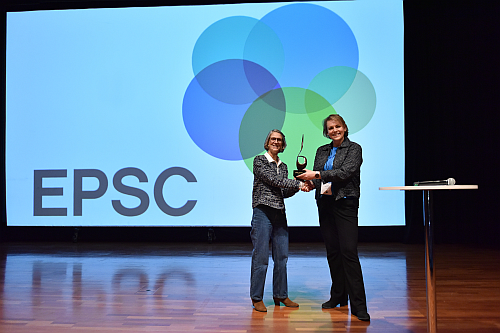
EPSC Award 2023: Delphine Laboureur
The 2023 EPSC Award was handed over to Delphine Laboureur by EPSC Board Member Dirk Roosendans during the 3rd European Conference on Plant & Process Safety in Maastricht.
Delphine is a researcher and professor at the von Karman Institute for Fluid Dynamics, working in the area of process safety since many years. With this award, EPSC is promoting diversity and encouraging women to pursue a career in process safety.
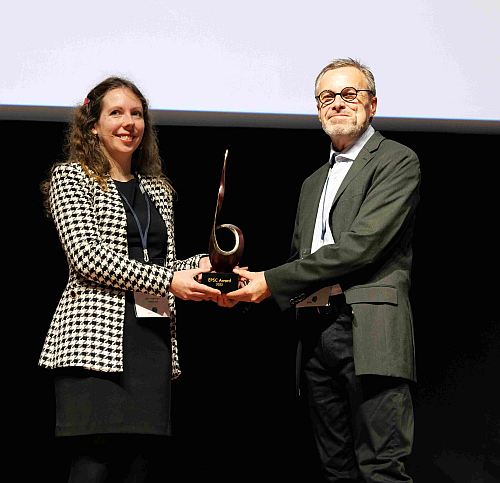
EPSC Award 2022: Simon-Mark Egan
The award for 2022 was given to Simon-Mark Egan of Solvay during the EPSC Technical Meeting on 12 April 2022 in Berlin.
Simon was elected for the award by the EPSC Board for his over 40 years career dedication to process safety, continuously improving understanding of hazards as well as improving design and operational practices. Further Simon developed and provided several process safety training programs that helped to create fundamental understanding on the topics within and outside Solvay.
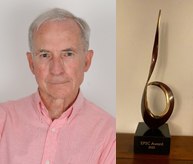
EPSC Award 2021: Thierry Poinsot
The award for 2021 was handed over to Dr. Thierry Poinsot by the EPSC Chair Pol Hoorelbeke during the EPSC European Conference on Plant & Process Safety in Antwerp on 13 September 2022. Here Thierry presented about combustion hazards including the options to simulate these. His presentation "Can we simulate safety scenarios linked to combustion?" can be found here.
Thierry has a long lasting career in combustion research, coaching companies and educating students. The many highlights of his career are summarized on his Wikipedia page.
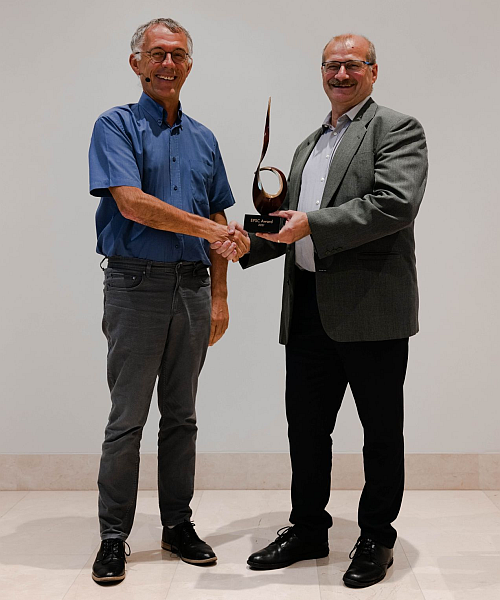
EPSC Award 2020: Francis Stoessel
Professor Dr. Francis Stoessel received the EPSC Award 2020 safely from EPSC Board Member Margit Hahn during the (virtual) Technical Meeting in October 2020. The award was presented to him as a symbol of EPSC Board’s recognition, and appreciation of a life-long career of outstanding contributions to comprehensive process safety risk analyses, and thermal, and chemical process safety analyses, and solutions that are being applied by EPSC members. More ...
His presentation given on "Thermal Process Safety / Criticality classes as a tool for assessment and design" on 6 October can be found here.
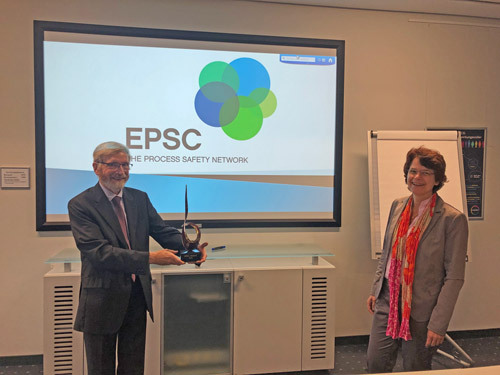
EPSC Award 2019: Kees van Wingerden
The 2019 Award Ceremony at the LP2019 conference: the prestigious EPSC Award was given by Pol Hoorelbeke to Kees van Wingerden (left), who received the Award for his long lasting technical contributions in the field of Process Safety.
EPSC Award 2018: Hans-Peter Schildberg
The 2018 EPSC Process Safety Award was presented during ACHEMA to Dr. Hans-Peter Schildberg of BASF SE, for his outstanding work on detonation resistant process design.
His presentation given at ACHEMA on "Gas Phase Detonations: Effective Pressures Acting on the Walls of the Enclosures and Probability of Deflagration-to-Detonation Transition in Pipes, Vessels and Packings" can be found here.
Dr. Hans-Peter Schildberg (right) receiving the award from Piet Knijff, chair of the EPSC Board.
EPSC Award 2015: Richard Gowland
At the autumn meeting of the EPSC Technical Steering Committee, the EPSC Award for 2015 was presented to former EPSC technical director, Richard Gowland in recognition of his extraordinary lifelong contribution to the field of process safety.
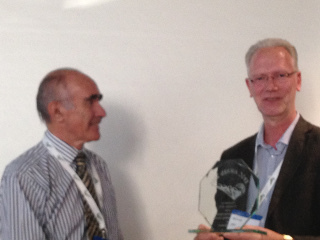
Richard has had a long and varied career in process safety, including 30 years at the Dow Chemical Company, independent work as specialist in safety instrumented systems, and risk and hazard analysis. He has shown his merit in everything from training courses to major incident investigations.
Following the oil depot fire at Buncefield in 2005 he was invited by HSE, the UK regulator, to chair a group which published guidance on LOPA for fuel storage sites. This work significantly advanced the use of LOPA methods in practice.
Since retiring from EPSC last year Richard continues to be active in process safety and remains as the Course Director for delivery of the IChemE LOPA training for both its in-company and public courses.
For these achievements, and many others great and small, EPSC has chosen to recognise Richard Gowland's unique influence in improving the theory and practice of process safety. The EPSC award celebrates and highlights the achievements of those who work towards a safer Europe.
EPSC Award 2014: Dirk Roosendans & Team
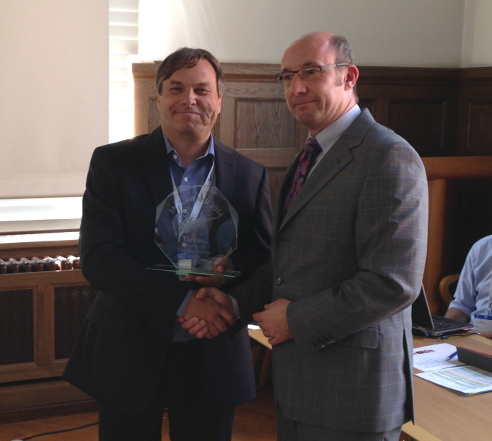
The EPSC Award for 2014 was presented to Dirk Roosendans and his team at Total
In recognition of work on a project named Total R², a team led by Dirk Roosendans has been given this year's EPSC award, presented at the Spring TSC meeting. The R² project was chosen from among many worthy nominations because it develops both a method for using QRA in placement of equipment within a facility, as well as providing a software tool for applying the method.
Total R² is intended for use in the design of facilities to handle flammable, explosive or toxic substances, such as hydrocarbon processing sites, transport networks, or pipelines. It is used to determine safe distances between process units, to prevent escalation of an incident via "domino effect" damage cascades, and also to determine areas of risk to structures or people. Use of this data during facility design allows optimal use of land without compromising safety.
Dirk Roosendans was presented with the award at a meeting of the EPSC technical steering committee hosted by BAM.
EPSC Award 2013: no award
EPSC Award 2012: Pol Hoorelbeke
In 2012, Pol Hoorelbeke, a researcher at the Free University of Brussels and Vice President of HSE for Total Petrochemicals, was given the award for his work on mitigation of the explosive risk of hydrocarbon clouds. His work involves the use of dust or aerosol sprays to change the combustion properties of an explosive mixture, reducing overpressure.
EPSC Award 2011: Martin Glor
The holder of the EPSC Award for 2011 is Dr. Martin Glor, recognised for his work on electrostatic ignition hazards in fluid transport.
EPSC Award 2010: US Chemical Safety Board
The award in 2010 was presented to the United States Chemical Safety Board for their safety video series which presented the causes and mechanisms of past incidents in an accessable manner. That year was the first time that the award was given to a non-european organisation.
EPSC Award 2009: Francis Stoessel
In 2009 the award was presented to Dr. Francis Stoessel of the Swiss Institute for the Promotion of Safety and Security, for his work on the development of the criticality scale for chemical batch and semi-batch reactions.
EPSC Award 2008: Andrew Hopkins
In 2008, the winner was Professor Andrew Hopkins, the first non-European to win the award, for his work on learning from accidents and process safety indicators.
EPSC Award 2007: Helmut Schacke
The 2007 winner was Dr Helmut Schacke for a life long contribution to process safety.
EPSC Award 2006: Roland Ott
The 2006 winner of the Award was Dr Roland Ott for a life-time achievement within the European process safety community.
EPSC Award 2005: Deltalinqs
In 2005 the recipient of the EPSC Award was Deltalinqs (Port and industries association Rotterdam safety management network) for their efforts to develop a regional knowledge network in the field of Safety Management Systems and incident investigation.
EPSC Award 2004: Anders Jacobsson
The 2004 Award was presented to Anders Jacobsson for his contribution to process safety particularly to Safety Management Systems for small and medium sized Enterprises and Management of Change.
EPSC Award 2003: Robin Brooks
In 2003 EPSC recognised Robin Brooks for his application of computer modelling to chemical operations to improve process safety.
EPSC Award 2002: Hans Pasman
In 2002 the winner of the EPSC Award was Professor Hans Pasman in recognition of a lifelong achievement to the process safety in Europe.
EPSC Award 2001: Team from the Catholic University of Leuven and DSM
In 2001 for the first time in the award’s history, a team was awarded the coveted prize. A combined team from the Catholic University of Leuven and DSM were recognised for their research in determining and modeling the explosion characteristics related to auto-ignition and detonation of various gas mixtures at extreme temperatures and pressures.
EPSC Award 2000: Jürgen Schmidt
In 2000 Jürgen Schmidt of BASF was the recipient of the third EPSC Award for his work on the sizing of two-phase flow relief systems.
EPSC Award 1999: Bernard Hancock
In 1999 the Management Board chose to honour the last Bernard Hancock, formerly International Co-ordinator of EPSC, who had played an enthusiastic and successful part in establishing the Centre in 1992.
EPSC Award 1998: Stuart Duffield
The EPSC Award was first presented in 1998 to Stuart Duffield of the Joint Research Centre (JRC) to recognise his work in producing the RELIEF computer package – a tool for understanding the phenomena associated with, emergency pressure relief systems for batch-type reactors and storage vessels.
EPSC Learning Sheet
The Learning Sheets are meant to stimulate discussion on important process safety topics at operational sites and to improve competency & awareness. Latest topic: Collapsed Bridge. Subscribe to our Learning Sheet Mailing List